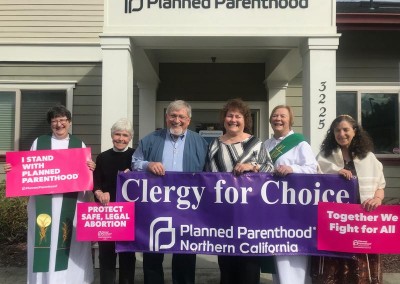
Posted September 5, 2022 by Acacia Roberts
"There are quieter voices among the faithful in America who have banded together in support of reproductive freedom."
Recent judicial decisions and legislation, locally and nationwide, have threatened the welfare and dignity of those requiring access to a safe abortion.[1] Protestors turned out in the thousands across the nation after the recent Dobbs decision was handed down from the Supreme Court, displaying messages and images depicting fetuses in utero and sharp one-liners designed to spark controversy and emphasize the significance of the reversal of Roe v. Wade.[2]
Religious voices are among the loudest voices condemning the right to seek a safe abortion and other vital healthcare services,[3] and many religious organizations came out in support of the Dobbs decision this past July.[4] From the constant right-wing rhetoric condemning abortion as a method of murder of future citizens, it might seem that a person must yield completely their religious views to support reproductive justice.[5]
Yet, this perspective ignores the nuance and variety in opinions among various historic and contemporary religious groups.[6] There are quieter voices among the faithful in America who have banded together in support of reproductive freedom.[7] Though religious institutions have long sustained a divergence between western religious doctrine and practice, evidenced by a deep-rooted reluctance to advocate for civil rights of its own congregants,[8] there are those who have been privately supporting the right of a woman to a safe abortion.
There are clergy members in rising numbers who are martialing their resources to oppose the current climate that has become increasingly violent toward women. The Religious Coalition for Reproductive Choice (“RCRC”) is a faith-based organization working toward reproductive justice in the United States.[9] RCRC began in the early 90s, but it was not a new concept at that time.[10]
This is not a new phenomenon: clergy members providing women access to safe, albeit illegal, abortions is a long-established tradition in the United States.[11] In 1967, the Clergy Consultation Service (“CCS”) was formed in New York to provide this service to those with “problematic pregnancies” through a telephone tree, and later, a like organization was founded in Ohio based off the CCS model, called Cleveland Clergy Consultation Service on Abortion (“CCCSA”).[12] In the first half of the 20th century in the United States, Catholics were the main proponent of anti-abortion activism. The issue was not a mainstay in Protestant Christian belief, as there was a diverse array of opinions on the issue.[13] As such, the network of clergy members that participated in CCS included reverends and ministers from various Christian Protestant denominations, as well as Jewish faith leaders from across the country.[14]
In the pre-Roe era, when a woman found herself pregnant with no option but to terminate the pregnancy, going to one’s religious leader was a first option for many.[15] This is something that seems unthinkable in today’s extreme climate.[16]In the 60s and the 70s, CCS and CCCSA operated via a telephone tree, where a woman in need of services would call a helpline in her geographic area, and describe the situation and her location.[17] She would then be connected to a provider in another state, and the organization would provide transportation so she could cross state lines, access the abortion, and then return. The state-line crossing was intended to create difficulties and complications in enforcing anti-abortion statutes.[18]
These organizations were created by religious leaders to band together and fight what they viewed as serious violations of human rights, but even their efforts were sometimes stymied by grifters. Sometimes, a woman would encounter a fake provider and/or return severely injured or ill from faulty equipment or undereducated “doctors.” [19] This highlights the need for regulation in abortion services, which cannot be implemented if an entire section of reproductive healthcare is completely banned.
The popular religious rhetoric may lead one to believe that strict adherence to religious beliefs and support for abortion access are mutually exclusive, but digging deeper into this issue reveals this false dichotomy.
Photo courtesy of Planned Parenthood of Northern California.
[6] Id.
[13] Id.
[14] Id.
[18] Id.
[19] Id.